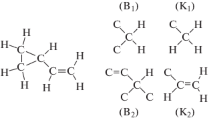Abstract
The article introduces an original problem of knowledge discovery from chemical reaction databases that consists in identifying the subset of atoms and bonds that play an effective role in a given chemical reaction. The extraction of the resulting characteristic reaction pattern is then reduced to a graph-mining problem: given lower and upper bound graphs g l and g u , the search of best patterns in an interval of graphs consists in finding among connected graphs isomorphic to a subgraph of g u and containing a subgraph isomorphic to g l , best patterns that maximize a scoring function and whose score depends on the frequency of the pattern in a set of examples. A method called CrackReac is then proposed to extract best patterns from intervals of graphs. Accuracy and scalability of the method are then evaluated by testing the method on the extraction of characteristic patterns from reaction databases.
Preview
Unable to display preview. Download preview PDF.
Similar content being viewed by others
References
Rose, J.R., Gasteiger, J.: Horace: An automatic system for the hierarchical classification of chemical reactions. Journal of Chemical Information and Computer Sciences 34(1), 74–90 (1994)
Hendrickson, J.B.: Comprehensive system for classification and nomenclature of organic reactions. Journal of Chemical Information and Computer Sciences 37(5), 852–860 (1997)
Satoh, H., Nakata, T.: Knowledge discovery on chemical reactivity from experimental reaction information. In: Grieser, G., Tanaka, Y., Yamamoto, A. (eds.) DS 2003. LNCS (LNAI), vol. 2843, pp. 470–477. Springer, Heidelberg (2003)
Inokuchi, A., Washio, T., Motoda, H.: An apriori-based algorithm for mining frequent substructures from graph data. In: Zighed, D.A., Komorowski, J., Żytkow, J.M. (eds.) PKDD 2000. LNCS (LNAI), vol. 1910, pp. 13–23. Springer, Heidelberg (2000)
Kuramochi, M., Karypis, G.: Frequent subgraph discovery. In: ICDM 2001: Proceedings of the 2001 IEEE International Conference on Data Mining, pp. 313–320 (2001)
Yan, X., Han, J.: Gspan: Graph-based substructure pattern mining. In: ICDM 2002: Proceedings of the 2002 IEEE International Conference on Data Mining, Washington, DC, USA, p. 721. IEEE Computer Society, Los Alamitos (2002)
Nijssen, S., Kok, J.N.: A quickstart in frequent structure mining can make a difference. In: KDD 2004: Proceedings of the tenth ACM SIGKDD international conference on Knowledge discovery and data mining, pp. 647–652. ACM Press, New York (2004)
Cook, D.J., Holder, L.B.: Substructure discovery using minimum description length and background knowledge. Journal of Artificial Intelligence Research 1, 231–255 (1994)
Fischer, I., Meinl, T.: Graph based molecular data mining - an overview. In: SMC (5), pp. 4578–4582. IEEE, Los Alamitos (2004)
Srinivasan, A., Muggleton, S.H., Sternberg, M.J.E., King, R.D.: Theories for mutagenicity: a study in first-order and feature-based induction. Artificial Intelligence 85(1-2), 277–299 (1996)
Dehaspe, L., Toivonen, H., King, R.D.: Finding frequent substructures in chemical compounds. In: Agrawal, R., Stolorz, P., Piatetsky-Shapiro, G. (eds.) 4th International Conference on Knowledge Discovery and Data Mining, pp. 30–36. AAAI Press, Menlo Park (1998)
Vladutz, G.: Do we still need a classification of reactions? In: Willet, P. (ed.) Modern Approaches to Chemical Reaction Searching, pp. 202–220. Gower Publishing (1986)
Author information
Authors and Affiliations
Editor information
Editors and Affiliations
Rights and permissions
Copyright information
© 2008 Springer Berlin Heidelberg
About this paper
Cite this paper
Pennerath, F., Polaillon, G., Napoli, A. (2008). Mining Intervals of Graphs to Extract Characteristic Reaction Patterns. In: Jean-Fran, JF., Berthold, M.R., Horváth, T. (eds) Discovery Science. DS 2008. Lecture Notes in Computer Science(), vol 5255. Springer, Berlin, Heidelberg. https://doi.org/10.1007/978-3-540-88411-8_21
Download citation
DOI: https://doi.org/10.1007/978-3-540-88411-8_21
Publisher Name: Springer, Berlin, Heidelberg
Print ISBN: 978-3-540-88410-1
Online ISBN: 978-3-540-88411-8
eBook Packages: Computer ScienceComputer Science (R0)




